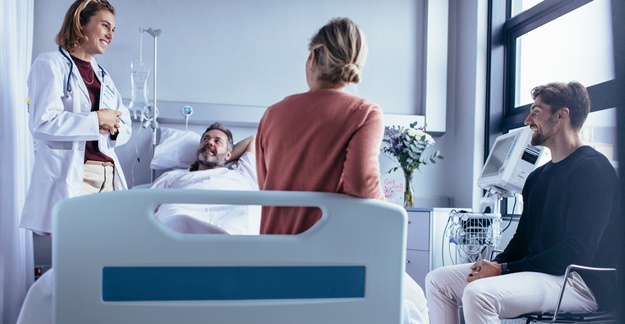People on dialysis for kidney disease are 100 time more likely than others to get staph dangerous hospital- acquired infections in their blood. Nearly 15,000 dialysis patients got blood stream infections in 2020, a third of which were staph (infections of a bacteria called Staphylococcus aureus).
While the number of infections has decreased since 2014, the risk remains, and disparities are prevalent. Black and Hispanic patients are more likely than their white counterparts on dialysis to get a staph in their bloodstream, according to a Centers for Disease Control and Prevention (CDC) report published February 6, 2023.
You’ve been admitted to the hospital. There are nurses, doctors, physician’s assistants, and various other healthcare providers and administrators buzzing around the floor and room. Having these professionals around to prepare you for procedures and help you heal is likely crucial to your recovery, but being surrounded by all of them, in addition to other patients, and even visitors, can also put you at risk for hospital-acquired infections that can seriously compromise your health, and in some cases, even be fatal.
What Are Hospital-Acquired Infections?
There are a lot of germs floating around in hospitals. Patients also tend to be especially vulnerable to infection due to the drugs they’ve been prescribed, the equipment that enters their bodies (such as catheters and ventilators), and the conditions for which they’re being treated.
Some of the most common hospital-acquired infections are:

Pneumonia
Pneumonia is a bacterial infection in your lungs. The risk of pneumonia is elevated when you’re on a ventilator, but even many patients who do not require ventilators contract what’s called non-ventilator hospital-acquired pneumonia.
Clostridium difficile (C. diff)
C. diff is a bacterial infection that takes hold in the gut. It’s most common to contract it after you’ve received powerful antibiotics. It causes severe diarrhea. It’s usually treated with even more antibiotics, but can recur, and the more times it comes back, the more likely it is to become fatal. If you’ve had C. diff more than once, your healthcare provider may suggest a fecal microbiota transplant.
MRSA / Staphylococcus aureus
Staphylococcus aureus is a bacterial infection. MRSA (Methicillin-resistant staphylococcus aureus) is a common form of the infection that is able to resist certain antibiotic drugs, making it especially difficult to treat. Typically a skin infection, MRSA can also invade open wounds and spread to the blood, causing sepsis, pneumonia, and even death.
Nontuberculosis Mycobacteria (NTM)
NTM is a bacteria that typically infects the lungs, but can also infect other areas. It exists throughout the environment in soils and is likely to cause problems when your immune system is weakened.
E. Coli / Gram-Negative Bacteria
Gram-negative bacteria is a category that includes many such as E. Coli, actinobacter, klebsiella, and more. A laboratory test can identify this category of bacteria that is likely resistant to many known antibiotics.
Yeast Infections
Candida is a yeast that normally lives in the human body, but overgrowths of it can cause uncomfortable yeast infections in the vagina or mouth. While these types of infections can typically be treated with antifungals, if your immune system is compromised, Candida can get into your bloodstream or internal organs can be dangerous and potentially fatal.
Where Do Hospital-Acquired Infections Come From?
The microbes that cause infections, such as bacteria and fungi, can get into your body in a variety of ways, from floating into your nostrils, to coming into contact with open wounds. However, when you’re in the hospital, there are four more common ways that a microbe can get into your body and wreak havoc. These are ways that you don’t generally have to consider when you’re at home.

Your Central Line: a central line is a small tube, similar to an intravenous line (IV). The main difference is that a central line goes into your vein much deeper into your body, close to the heart. Healthcare providers use it to deliver drugs. If germs get into your central line, they can cause dangerous blood infections called Central Line-Associated Blood Infections (CLABSI).
What you can do: Ask to make sure your healthcare provider is washing their hands before touching your central line. Do not touch it yourself. Tell a nurse or doctor if the bandage is peeling off. Ask any visitors to wash their hands with soap and water before and after each visit.
Your Catheter: a catheter is a tube that goes through your urethra, to the bladder to drain your urine. If germs get in here, they can cause urinary tract infections (UTIs).
What you can do: Request that the person inserting the catheter wash their hands first. Ask questions about why you need the catheter and how long you will have it. Check in regularly about whether or not the catheter is still needed. The earlier it is removed, the lower your risk.
Your Surgical Site: Germs can infect the skin as it heals from your surgery. In some cases, it can get inside the surgical site and infect the surrounding tissues.
What you can do: As with other procedures, make sure your provider washes their hands before touching your surgical site. You should avoid touching the site whenever possible, and take not of any irritation or redness that develops and report it to your provider.
Your Ventilator: a ventilator is a tube placed in your mouth or nose to help you breath. You can get pneumonia if germs get into this tube and travel to your lungs.
What you can do: If you are on a ventilator, your family members will have to be the ones to advocate for you. They should ask to make sure that your providers are checking daily for your ability to breathe on your own. They should ask about the angle of the head of your bed. The best angle for those with a ventilator is 30-45 degrees, but depending on your medical condition, this may not be possible. They should ask providers to clean your mouth regularly.
Changing Rates of Infection
The Centers for Disease Control and Prevention (CDC) monitor outbreaks of several common types of hospital-acquired infections. Over the past decade, enhanced protocols for limiting infections and reporting those that do occur have led to a decline in the number of these infections, though they are still common. Approximately one out of every 31 hospital patients is thought to have at least one hospital-associated infection.
Throughout the pandemic, rates of almost all types of common hospital-acquired infections increased, except C. diff. The CDC found that ventilator-associated events, such as pneumonia, increased dramatically. Between 2019 and 2020, the rates of these infections raised by 50 to 60%.

What You Can Do to Protect Yourself

Monitor yourself for signs of hospital- acquired infection.
One of the most important things you can do to protect yourself is alert your healthcare staff as soon as possible if you notice any potential signs of infection including:
- Redness or pain surrounding the area ofcatheter or other tube that has been inserted into your body
- Diarrhea, especially if it occurs three or more times in a 24-hour period, as this could be caused by C. diff.
- Any other new symptoms such as coughing, headaches, fever, or pain when urinating
Avoid touching surfaces and your face.
Alice Williams, MD, an emergency medicine physician who writes a blog on healthy living, says it’s important not to touch anything in your room that you don’t need to touch. Your hands can carry germs which find their way into your bodya through your mouth, any wound you have, your eyes and any other orifice on your body you might touch.
Wash your own hands regularly.
Because it’s impossible to avoid coming in contact with any germs at all, we all know it’s important to wash our hands with soap and water. It’s especially important to wash them after touching surfaces that could be contaminated such as doorknobs and bedrails, explains Williams.
Get your flu shot to prevent hospital- acquired infections
Influenza can be fatal, especially when youre immune system is challenged by whatever put you in the hospital. It’s a respiratory illness that can travel easily through the air and tiny droplets from speaking, coughing or sneezing in hospitals . Unless your healthcare provider says otherwise, it’s best to make sure you are up to date on all your vaccinations, including the annual flu shot.
Ask visitors to wear masks, frequently wash hands, or postpone visits altogether.
If a friend or family member wants to visit, consider asking them to wear a mask and wearing one yourself to reduce the chance of respiratory infections, says Williams. If they are feeling under-the-weather at all, it’s best to ask them to postpone their visit until they’re feeling better, says Williams.
Erica Susky, Msc, an Infection Control Practitioner (ICP) in Toronto, Canada, points out that COVID-19 is still circulating, and even if it wasn’t, respiratory infections like influenza would still pose a risk.
“It is still very important for all to wear masks in healthcare settings,” she says. “But visitors need to be reminded when visiting their loved ones to keep them on for the entire visit.” She emphasized that, even if the infection doesn’t seem severe to the visitor, it could pose a great risk to patients, and slow their recovery.
Bring a toothbrush
One of the simplest ways to limit your risk of getting non-ventilator hospital-acquired pneumonia (a common infection that is not tracked by the CDC, but can kill up to 30% of those it infects) is by brushing your teeth. This can help prevent bacteria from your mouth traveling to your lungs.
Unfortunately, a Kaiser Health News article explains that sometimes this is easier said than done. Hospital staff members don’t always remember to provide toothbrushes, and it may not be at the front of your mind, either. Consider coming prepared, so you can brush your teeth regularly if you are not on a ventilator. If you are confined to the bed, ask staff to help. If you forget your toothbrush, ask for one.
Shower and use clean sheets before arrival.
If your procedure has been scheduled in advance, Beth Hawkes, RN, owner of NurseCode suggests taking a shower with antiseptic soap and sleeping on newly-cleaned sheets the night before you go to the hospital, to reduce the likelihood of carrying germs with you to the hospital that might infect you later when you’re more vulnerable.
Speak up
Amanda Lunberg, RN, and expert at ParentsWonder, explains that every hospital has sets of “standard precautions” that help prevent providers from sharing germs with patients. However, “these precautions are not without fault, user-error being the biggest culprit,” she says.
“It’s OK to speak up. It sometimes could be a friendly reminder to wash their hands before they fix your I.V., or putting on a mask if they are performing mouth care. Most healthcare providers will be thankful for the reminder,” she adds.
If you get dialysis regularly, ask about methods other than using a central venous catheter, that may reduce your risk of staph infections.

Leave the Hospital As Soon As You Can
If your healthcare team says you are able to leave and continue recovering at home, you should.
“Being discharged from a hospital as soon as possible also reduces one’s chances of getting an infection, as being in the community is better overall for reducing potential contacts for infectious agents and is also better for a patient’s mental health,” says Susky.






